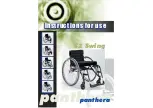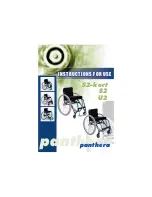
6
MOVING ON THE WHEELCHAIR
Moving on rough terrain
Moving on an undulating terrain creates more risk. It is important to follow the safety principles
stated below. Failure to comply with these principles may lead to serious injuries.
It is not recommended to move the wheelchair on slopes with inclination exceeding 10°. It is
essential to remember that wet surface will additionally reduce the grip of the wheelchair and
will impair the functioning of brakes when ascending and descending a slope.
When in vertical position, it is not allowed to ascend on a slope with inclination greater than 3°.
The speed is automatically reduced, according to the inclination angle and the selected position.
In extreme conditions, the system shall make it impossible to move any further.
It is not recommended to move backwards when descending slopes.
It is not recommended to move on uneven, dirt roads (sand, gravel, grass).
When descending a slope, it is recommended to move with minimum speed.
Do not get off the wheelchair and do not get on a standing wheelchair on an inclined surface
(always place the wheelchair in an even, flat surface first).
When conquering a slope, always ascend following a straight line, according to the inclination of
the slope.
Moving to an upright position
Consult your physician and ask whether an upright standing position is safe in your case.
When you are moving to an upright position for the first time, the whole process should be
supervised by a qualified medical personnel, since many various impairments can occur in such
situations.
Use the verticalization function only when the wheelchair is in the drive mode (the electric
power supply is on) - only when the braking system is activated.
Move to an upright position only when the wheelchair stands on a stable, even and dry surface,
otherwise moving to an upright position may result in fall and injury.
It is not recommended to move in an upright position outside and on long distances. Moving in
an upright position is allowed only in small, enclosed spaces (kitchen, office, etc.)
Pay special attention and check that no parts of garments or parts of the body can be pinched
when lowering the seat (when moving to a sitting position). Be particularly careful.
Verticalization allows:
Prevent muscle spasms in lower limbs.
Regulate functioning of the respiratory, circulatory and excretory system, as well as gastrointestinal tract.
Regulate muscle tension (prevent spasticity).
Reduce the risk of osteoporosis (minimise calcium extraction from bones).
Reduce the risk of decubitus ulcers.
Increase the feeling of independence when performing activities of daily living (positive psychological
aspect).







































